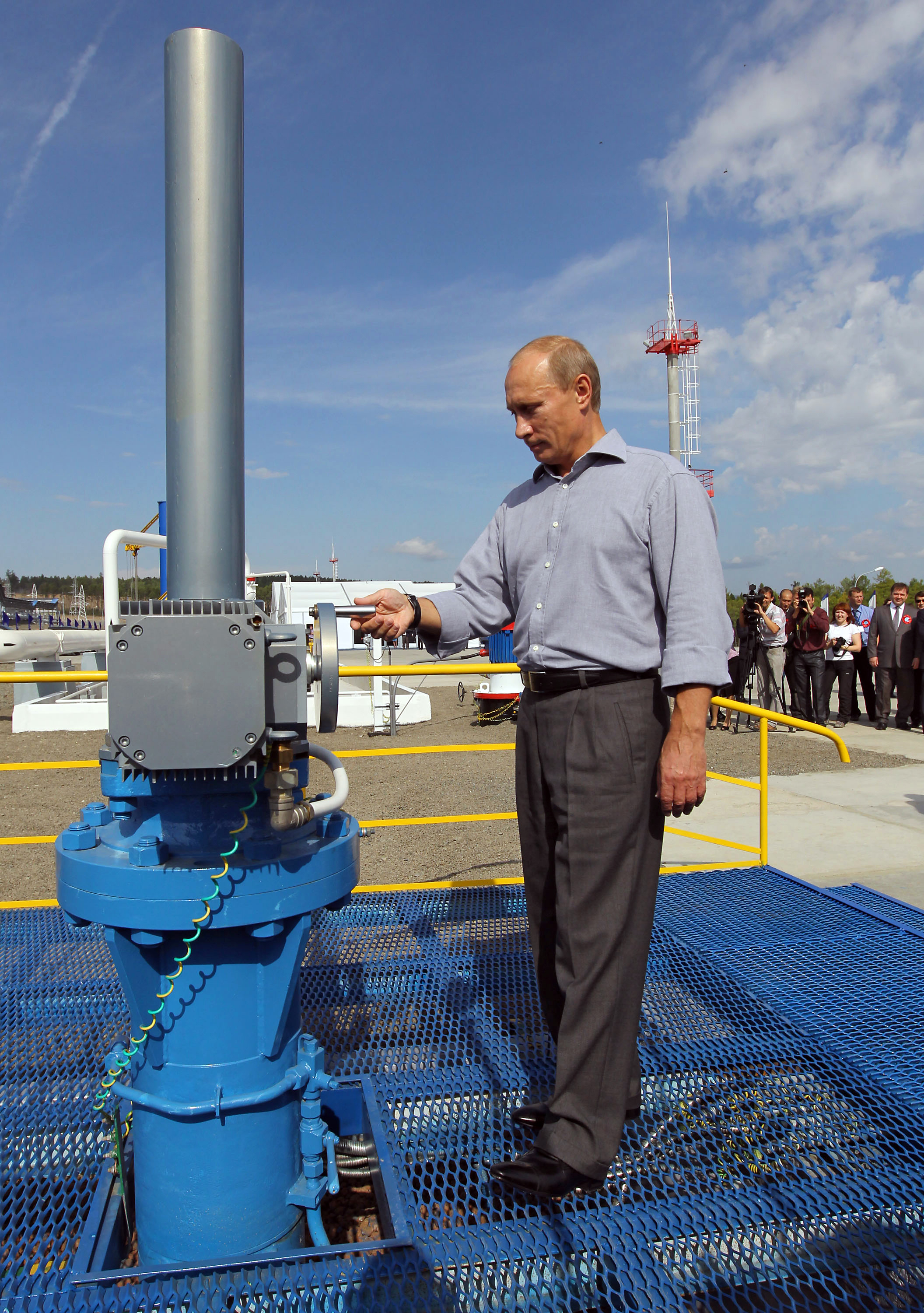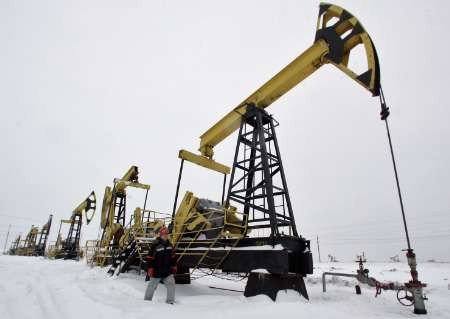By Steve LeVine

The US and Europe have yet to fully deploy their bluntest weapon against Vladimir Putin. But if stronger sanctions are deployed against him, the Russian president is vowing to make life very painful for the western oil companies doing business in his country.
The US this week quietly targeted some Russian oil industry bosses in its latest round of sanctions, and Europe has altogether avoided oil in its list of new targets. But on April 29, Putin suggested that he’s prepared to mount an oil war if antagonized further.
“We would very much wish not to resort to any measures in response,” Putin said. “I hope we won’t get to that point. But if something like that continues, we will of course have to think about who is working in the key sectors of the Russian economy, including the energy sector, and how.” The remark appeared to be a swipe at lucrative long-term Russian projects being carried out by oil majors BP, Shell, France’s Total and ExxonMobil.

Obama administration officials have told the New York Times’ Peter Baker that Putin’s personal wealth is the “nuclear” option in terms of sanctions. But that is true only if personal enrichment is Putin’s central concern. If his driving force is instead historical glory, which is arguably the case, then oil—and its pivotal importance to Russia’s economy—is more important.

The revenue from high-priced oil exports is why Putin can prosecute his shadow war of territorial expansion in Ukraine. Russia’s future production in Siberian shale and Arctic oil will underpin the country—along with the political careers of Putin and his successors—through the 2020s. That future production is also why the western oil majors have all publicly said it is business as usual with Putin.
Specifically, oil and petroleum product exports account for an estimated 41% of Russian state budget revenue—$167 billion this year alone. Russia’s projected overseas 2014 oil and oil product sales of $275 billion will make up three-fourths of the country’s total exports.
But that picture could be altered significantly should the US and Europe sanction Russia’s two big energy companies, Rosneft and Gazprom, and thus prevent the western oil majors from helping Russia to develop the shale and Arctic plays. Many analysts believe that Russia’s ability to exploit the Arctic would be crippled without western expertise.

Further sanctions will be a central topic when US president Barack Obama meets for four hours in Washington tomorrow with German chancellor Angela Merkel. But, even if Obama is prepared to strike Russia’s oil companies, few believe that Europe will go along.

Texas-based ExxonMobil (NYSE:XOM) is also exploring for oil in the Russian Arctic
That hesitancy is at least partly why Russia and its supporters continue to swallow up town after town in eastern Ukraine as the days count down to competing elections to define Ukraine’s future—a May 11 referendum for the sovereignty of at least two Ukraine cities, and a May 25 Ukraine presidential election. Those elections are likely to make official what Putin has made plain: that he believes that eastern Ukraine is already his.
"Russia problem" rumbles on for BP and other western companies


Russian oil producer TNK-BP
BP’s deep involvement in Russia, home to the world’s largest reserves of oil and gas, was once considered a key competitive advantage in an industry craving access to petroleum resources.


 Shell's Noble Discoverer drilling rig on the Chukchi Sea, seen from the deck of the Tor Viking icebreaker.
Shell's Noble Discoverer drilling rig on the Chukchi Sea, seen from the deck of the Tor Viking icebreaker.
But the east-west stand-off over Ukraine has called BP’s strategy into question. Some now wonder whether what was once a strength could turn into a weakness, and a big source of geopolitical risk.
It was a point that emerged forcefully at BP’s and it might happen Russia expropriate BP’s 20 per cent stake in Rosneft, the Kremlin-controlled oil company, if relations between Russia and the west continued to worsen. Might BP be affected if the US and EU tightened their sanctions on Moscow?
The tone was set by Robert Barrett, a private shareholder during BP's sharerholders annual meeting on April 10. He noted how much of BP’s production and profits were concentrated in Russia and asked about the risk of its Rosneft stake being nationalised – a move that he said would have a “huge financial impact”.
Bob Dudley, BP’s chief executive, acknowledged back then that the situation in Ukraine was the “focus of world attention”. But he defended BP’s involvement in Russia, saying its interest in Rosneft “gives us nearly a fifth of the world’s largest publicly traded oil company operating in a country with massive reserves and massive potential”.

BP’s chief executive added that BP could act as a “bridge” between Russia and Europe, which were connected by a strong mutual dependence.
BP has so far been unaffected by the visa bans and asset freezes imposed by the West after Moscow annexed Crimea. But it could be exposed if the US and EU launch a new round of sanctions hitting strategic sectors of the Russian economy such as energy.
Russia accounts for nearly a third of BP’s global oil production and more than a third of its reserves, while Rosneft contributed about 16 per cent of BP’s annual profit last year and 2 per cent of its net cash flow from operations.
The emergence of a “Russia problem” will feel like deja-vu for BP, and in particular Mr Dudley. In the 2000s, the company was hit by a steady drumbeat of negative headlines about its tussles with AAR, the consortium of oligarchs who were its partners in its Russian joint venture TNK-BP. In 2008 Mr Dudley himself, at the time the boss of TNK-BP, fled Russia after coming under intense pressure from regulators.
After a string of vicious shareholder disputes between the two, BP last year sold its 50 per cent stake in TNK-BP to Rosneft, in a deal that left it with $12.5bn in cash and a 19.75 per cent stake in Rosneft.
Carl-Henric Svanberg, BP’s chairman, responded to shareholder concern by playing down the company’s involvement in Russia. He said the $15bn it has invested there was equal to its commitment to Azerbaijan, and on the same scale as a recently launched offshore project in Angola, PSVM.
Deals underscore attraction
Rosneft has set up joint ventures with ExxonMobil, Statoil of Norway and ENI of Italy to drill for oil offshore, with the foreign groups in each case footing the bill for exploration. Exxon’s deal is the most ambitious, covering 773,000 square kilometres in the Arctic and the Black Sea. Statoil has been granted acreage in the Sea of Okhotsk and the Barents Sea, while ENI is in the Barents and Black Seas.

Total, the French major, has a 20 per cent stake in Yamal LNG, a liquefied natural gas project in the far north of Russia where it is partnering with Novatek, Russia’s largest independent gas producer.
Royal Dutch Shell, too, has a big footprint in Russia. The company is a partner with Gazprom in the huge Sakhalin 2 LNG venture in Russia’s far east and with Gazpromneft in Salym, a big oilfield in western Siberia.

In an interview a month ago, Ben van Beurden, Shell’s chief executive, said he was monitoring the Ukraine crisis “very closely”, but said there was little he could do to influence geopolitical events. Worrying too much about Crimea “would not improve the quality of our decision-making”. Anyway, he said, “it’s in the nature of our industry to live through periods of uncertainty”.
Meanwhile, Mr Dudley stressed that BP’s investment horizon was so long that it could ride out temporary crises, including the current east-west dispute over Ukraine. He pointed to Egypt, where BP has been present for 50 years and where it stayed put despite the violent turmoil of the Arab Spring.

No comments:
Post a Comment